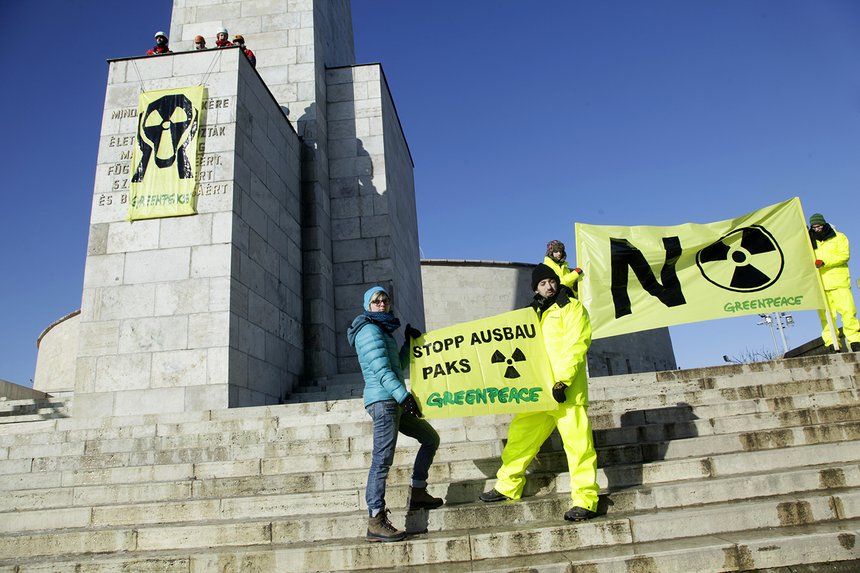Violations of the environmental assessment procedure for Hungarian Paks II nuclear power plant

Today several environmental organizations and individuals filed a complaint to the United Nations Aarhus Convention Compliance Committee (ACCC) on irregularities in the approval of the Hungarian nuclear power plant Paks II. The complainants from five different EU states accuse the Hungarian government of having violated their international obligations during the transboundary Environmental Impact Assessment (EIA) for the planned nuclear power plant project and thereby infringed international law. For this reason, the Czech environmental NGO Calla, the German energy cooperative Greenpeace Energy, the Foundation Terra Mileniul III from Romania, the Austrian Institute of Ecology (Österreichisches Ökologie-Institut), the Munich Environmental Institute (Umweltinstitut München) and the private individuals Brigitte Artmann and Jan Haverkamp submitted a communication to the Aarhus Compliance Committee in Geneva.
At the beginning of 2015, Hungary officially notified all EU Member States of its intention to build the Paks II nuclear power plant. As a result, many EU countries, including those where the complaining organizations are based, informed Hungary that they intended to participate in a transboundary environmental impact assessment (EIA). After the competent Hungarian authority’s approval, the EIA procedure was completed in September 2016. Between 2015 and 2016, the complaining parties had submitted critical comments in the EIA procedure. They took part in hearings on various environmental risks of the planned construction of a new nuclear power station, such as insufficient plans for handling nuclear waste, the risk of severe nuclear accidents with transboundary effects and a threatening increase in temperature of the Danube river due to the discharge of hot cooling water from the nuclear power plant. "Apparently, the Hungarian government has not taken the inputs of the concerned participants in the process seriously," says Gabriele Mraz of the Austrian Institute of Ecology. The complainants criticize, inter alia, the following points:
- The process itself involved only the construction of the Paks II nuclear power plant at the existing Paks site on the basis of the Hungarian energy strategy. In Hungary, neither alternative sites nor alternative nuclear reactor designs nor alternative ways to meet the required energy production, such as renewable energy sources have been considered. This contradicts the Aarhus Convention, which requires that all options must still be open at the start of the procedure.
- The organizations and individuals involved have not been actively informed by the Hungarian Government about the progress of the EIA procedure, the publication of new documents and changed time limits schedules for construction, nor about the final approval of the nuclear power plant’s environmental permit. In addition, documents provided by Hungary did not have the required quality of content.
- Participants were directly verbally attacked by Hungarian government officials during a public hearing in Hungary, without the organizers of the hearing stepping in to prevent it. This form of harassment is also in violation of the Aarhus Convention.
"We regard the behavior of the Hungarian authorities as a significant violation of our rights as participants and are therefore now jointly taking action," says Sönke Tangermann, managing director of Greenpeace Energy. An action before a Hungarian court is not possible for the complainants in this case, after the Hungarian Supreme Court decided at the beginning of 2019 that such steps are only permitted within the time limits set by official bodies, and none of the involved organizations was informed timely about deadlines. The parties expect that the responsible Aarhus Convention Compliance Committee will start dealing with the submitted complaint before the summer break. At the same time, a complaint to the Implementation Committee of the Espoo Convention is being prepared.
Background on Paks II: Since the mid-1980s, four nuclear reactors with a total net output of around 1,800 megawatts (MW) have been in operation at the Paks site in Hungary. Their planned shutdown should take place in the mid-2020s after a 40-year lifespan expires. To avoid bottlenecks in the power supply, two new reactors with a total net capacity of 2,400 MW are to be built on the same site under the name of Paks II. According to the original official planning, the investment costs are estimated at around 12 billion euros. The reactors should generate electricity from 2026/2027 on. According to the World Nuclear Association, there is a Russian financing proposal for 80 percent of the investment costs. The Hungarian Parliament approved the terms of financing in February 2017. The Russian state-owned company Rosatom expects construction to start in 2020.
Press contacts
Netherlands:
Jan Haverkamp
Consultant for nuclear energy and energy policy
t: +31 621 334 619
e: jan.haverkamp@ecn.cz
Austria:
Gabriele Mraz
Österreichisches Ökologie-Institut
Scientific Associate
t: +43 699 1 523 61 31
e: mraz@ecology.at
Germany:
Christoph Rasch
Greenpeace Energy eG
Policy and Communications officer
t: + 49 30 28482 210
e: christoph.rasch@greenpeace-energy.de
Germany:
Hauke Doerk
Umweltinstitut München
Consultant for radioactivity
t: +49 89 307749-40
e: hd@umweltinstitut.org